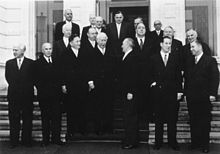Waldemar Kraft
Waldemar Kraft was born to a Protestant German family in Brzustow, Jarotschin district, in the Province of Posen on the Prussian-Russian border (today Brzostów, Poland).
After the war he chose to return to the Greater Poland and from 1921 to 1939 he was the director of the Hauptvereins der Deutschen Bauernvereine or Main German Farmers' Associations in Poznań.
In 1950 he was among the founders of the Gesamtdeutscher Block/Bund der Heimatvertriebenen und Entrechteten (often abbreviated in texts to "GB/BHE") or All-German Bloc/League of Expellees and Deprived of Rights in Schleswig-Holstein.
[1] In March 1956 Kraft, Finckenstein and Theodor Oberländer joined the CDU, which led to the decline of influence of the All-German Bloc/League of Expellees and Deprived of Rights in German politics.
[2] Opinion revolves around his involvement in the SS, but it is unclear whether Kraft volunteered for the SS-Ehrenführer post at his own initiative or to advance his career or whether he was pressured to do so by his immediate superiors.
Both the Minister for Agriculture, Richard Walther Darré, and the Gauleiter of Warthegau, Arthur Greiser, were senior and important SS officers and that may have influenced Kraft.
